人教版2025中考英语一轮复习八下Units 1-2 课件(共45张PPT)
文档属性
| 名称 | 人教版2025中考英语一轮复习八下Units 1-2 课件(共45张PPT) |
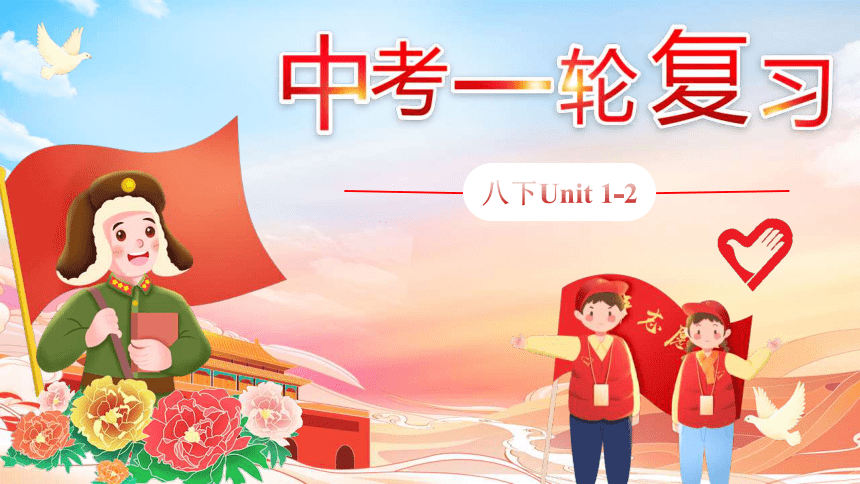
|
|
| 格式 | pptx | ||
| 文件大小 | 84.7MB | ||
| 资源类型 | 教案 | ||
| 版本资源 | 人教新目标(Go for it)版 | ||
| 科目 | 英语 | ||
| 更新时间 | 2025-03-25 19:08:58 | ||
图片预览


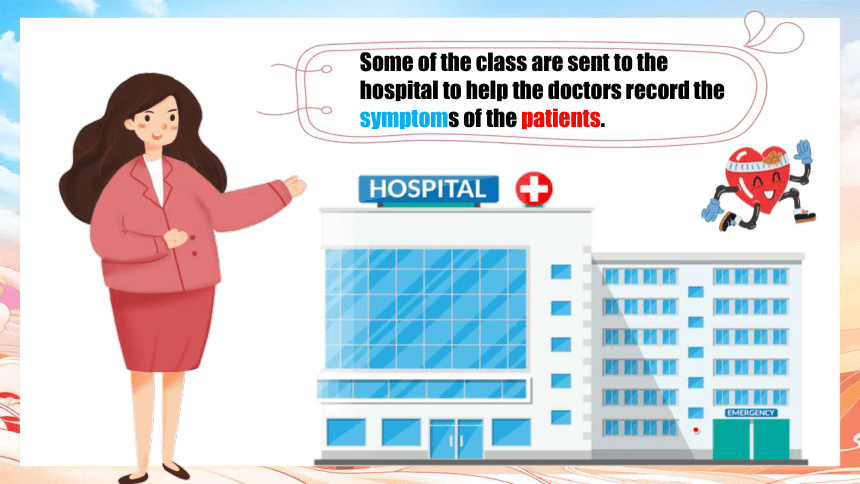
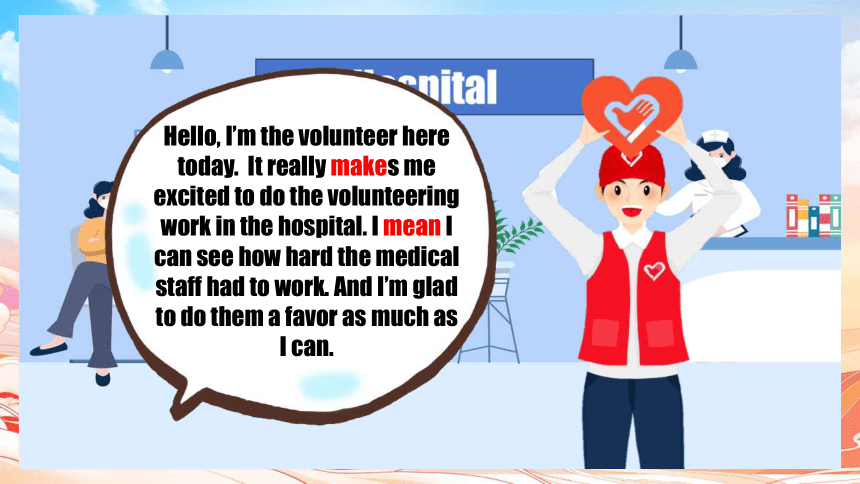
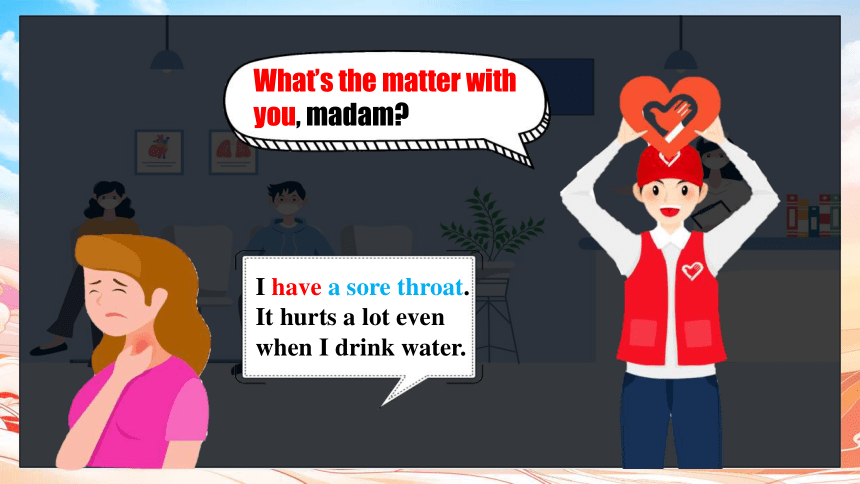
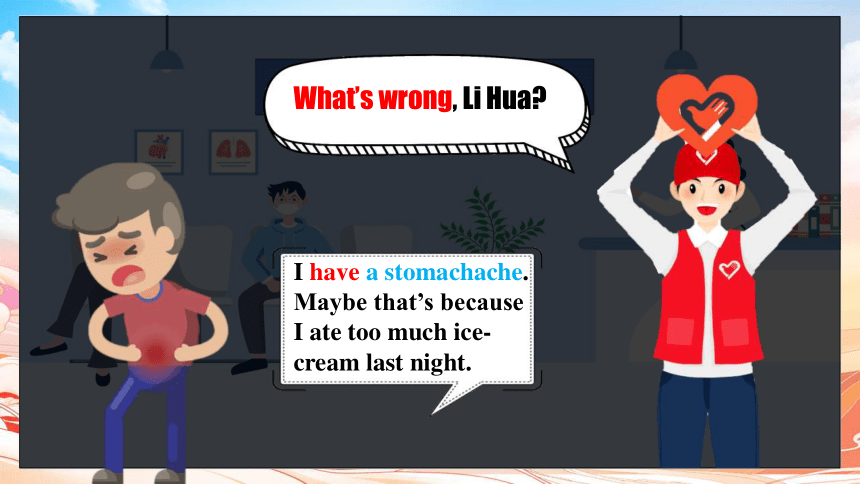
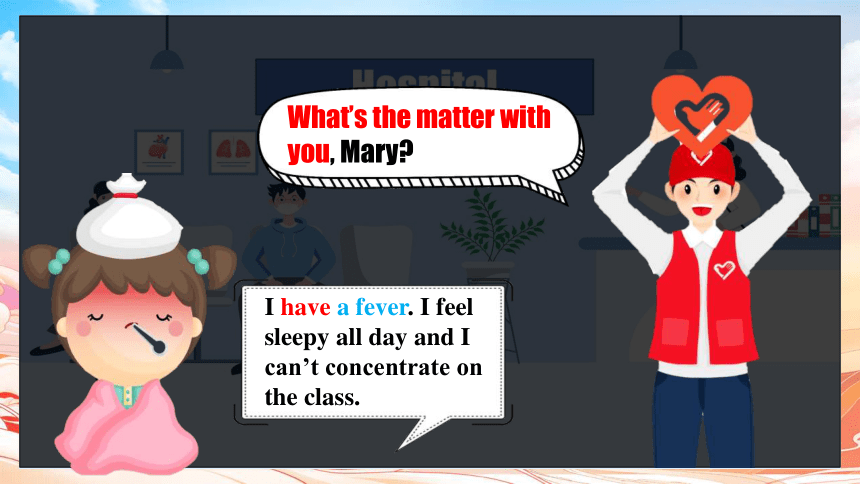

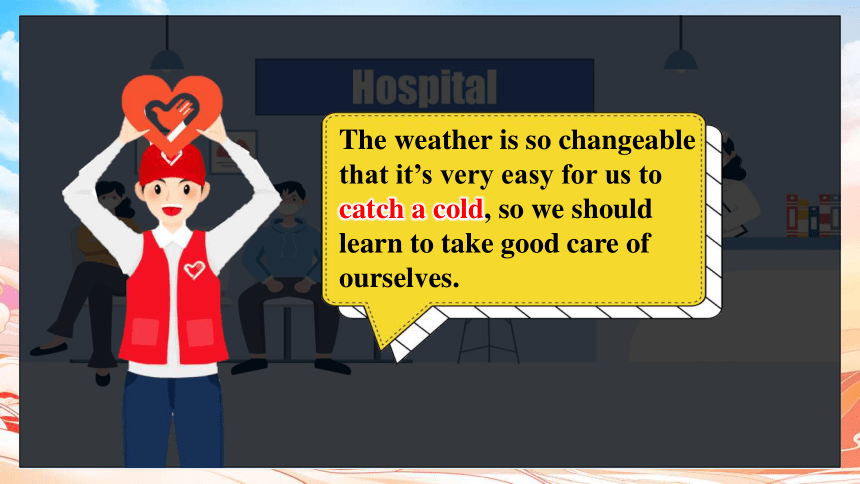
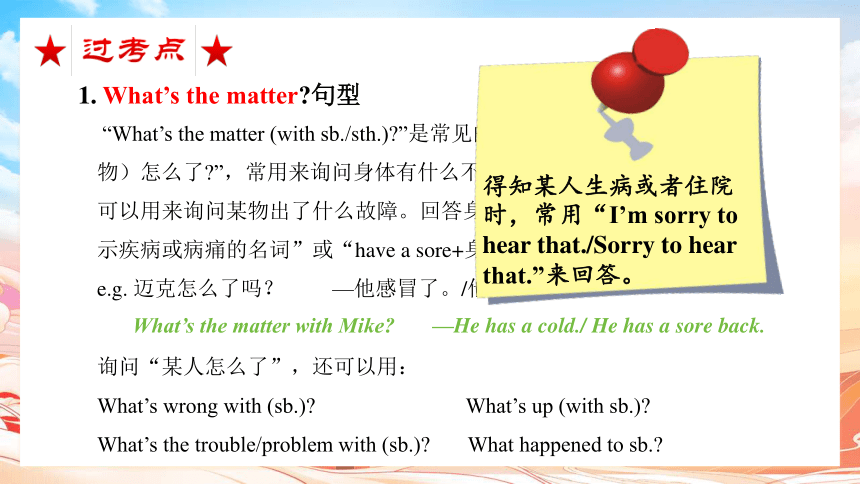

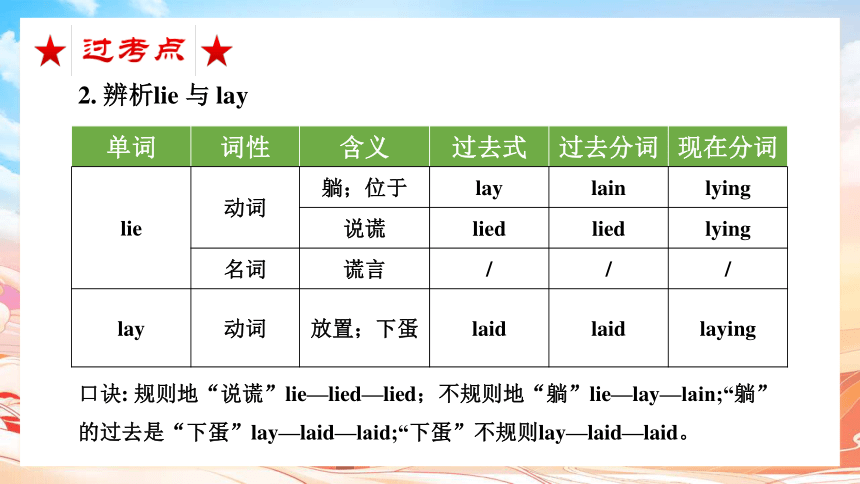
文档简介
(共45张PPT)
八下Unit 1-2
March is also considered as a month to follow the examples of Comrade Lei Feng. This weekend, our school organizes some volunteer activities to pay tribute to him.
Some of the class are sent to the hospital to help the doctors record the symptoms of the patients.
Hello, I’m the volunteer here today. It really makes me excited to do the volunteering work in the hospital. I mean I can see how hard the medical staff had to work. And I’m glad to do them a favor as much as I can.
What’s the matter with you, madam
I have a sore throat. It hurts a lot even when I drink water.
What’s wrong, Li Hua
I have a stomachache. Maybe that’s because I ate too much ice-cream last night.
What’s the matter with you, Mary
I have a fever. I feel sleepy all day and I can’t concentrate on the class.
What’s wrong with you
I have a backache. I had a relapse while I was working on the farm.
Maybe you should lie down and have a rest.
The weather is so changeable that it’s very easy for us to catch a cold, so we should learn to take good care of ourselves.
1. What’s the matter 句型
“What’s the matter (with sb./sth.) ”是常见的口语表达,意为“(某人/某物)怎么了 ”,常用来询问身体有什么不适或有什么不顺心的事,也可以用来询问某物出了什么故障。回答身体不适时常用“have+a(n)+表示疾病或病痛的名词”或“have a sore+身体部位名词”。
e.g. 迈克怎么了吗? —他感冒了。/他背很酸痛。
What’s the matter with Mike —He has a cold./ He has a sore back.
得知某人生病或者住院时,常用“I’m sorry to hear that./Sorry to hear that.”来回答。
询问“某人怎么了”,还可以用:
What’s wrong with (sb.) What’s up (with sb.)
What’s the trouble/problem with (sb.) What happened to sb.
1. What’s the matter 句型
(1). —What’s the matter ________ the woman
—She has a cold.
(2). —What happened _____ Henry this morning
—He missed his bus and got to school late.
(3). —_____________________________________________
—I have a bad headache. I stayed up too late last night.
with
to
What’s the matter / What’s wrong / What happened ...
2. 辨析lie 与 lay
单词 词性 含义 过去式 过去分词 现在分词
lie 动词 躺;位于 lay lain lying
说谎 lied lied lying
名词 谎言 / / /
lay 动词 放置;下蛋 laid laid laying
口诀: 规则地“说谎”lie—lied—lied;不规则地“躺”lie—lay—lain;“躺”的过去是“下蛋”lay—laid—laid;“下蛋”不规则lay—laid—laid。
2. 辨析lie 与 lay
(1). Motuo ______ in the south of the Himalayas in Tibet.
(2). A couple kill the goose that ____ golden eggs because they want to get rich fast.
(3). The doctor advised to ____ down and have a rest.
(4). We shouldn’t tell _____ to others.
lies
lays
lie
lies
3. trouble的用法
(1)trouble作名词,意为“问题”,常用于以下表达中:
be in trouble(陷入困境);
have trouble (in) doing sth.(做某事有困难)
e.g. 如果他有麻烦,我会帮他的。
If he is in trouble, I will help him.
(2)trouble作动词,意为“打扰”,常用短语:trouble sb.(打扰某人)
e.g. 不好意思打扰你。
I’m sorry to trouble you.
例题:—I have trouble him understand. Can you help me
—No problem.
A. make B. making C. to make D. made
B
4. breath 的用法
(1)做可数名词时,表示“一口气”。
e.g.当你紧张时,深呼吸对你是有帮助的。
It is helpful for you to take a deep breath when you are nervous.
(2)做不可数名词时,表示“呼吸,气息”。
e.g.他喘不过气来。
He has great difficulty in catching his breath.
v. breathe
n. breath
adj. breathless
拓展:
关于breath的常用短语: out of breath 喘不过气来 hold one’s breath 屏住呼吸
4. breath 的用法
(1). I was out of breath when I got home yesterday.
______________________________________________
(2). I took a deep breath and tried to calm down.
______________________________________________
(3). A fever increases your breathing rate(频率).
______________________________________________
(4). He held his breath and dared not move.
______________________________________________
我昨天到家的时候上气不接下气。
我深吸了一口气,试图冷静下来。
发烧会增加你的呼吸频率。
他屏住呼吸,一动也不敢动。
5. imagine的用法
imagine是一个动词,它的名词形式是imagination,是一个不可数名词,常用短语有:out of imagination 超出想象
5. imagine的用法
(1). It is hard to imagine a life without water.
______________________________________________
(2). Jack loves science. He often imagines himself to be a great scientist.
____________________________________________________
(3). Can you imagine living in a place where there is no Wi-Fi
__________________________________________________
(4). Close your eyes and imagine (that) you are in a forest. _____________________________________________________
很难想象没有水的生活。
杰克热爱科学。他常常想象自己是一位伟大的科学家。
你能想象住在一个没有无线网络的地方吗?
闭上你的眼睛,想象你在森林里。
6. make it +adj. for sb. to do sth.结构
make it +adj. for sb. to do sth.意为“使(某人)做某事是……的”,其中it是形式宾语,真正的宾语是后面的不定式短语。
类似这种用法的词还有find, think, feel等。此外,类似的句型还有:谓语+it+n.+(for sb.) to do sth.
e.g.我认为我很荣幸被邀请在这里演讲。
I think it my great honor to be invited to speak here.
我们老师规定在课堂上决不能讲话。
Our teacher made it a rule never to talk in class.
6. make it +adj. for sb. to do sth.结构
(1). He ___________ it important to learn English well.
(2). All these noises _____ it impossible to go on with the work.
(3). I _________ it pleasant to work with him.
(4). They _____________ it difficult to finish the work in two days.
(5). We _____ it our duty to clean our classroom every day.
felt/thought
made
think/find
found/ thought
think
7. mean的用法
mean作为动词,意为“意思是;打算;意欲”,过去式与过去分词均为meant。其常见用法如下:
mean doing 意味着做某事 Using less water means saving money and energy. 少用水意味着节约钱和能源。
mean to do 打算做某事 I didn’t mean to hurt you although I actually made you angry.
虽然我让你生气了,但我并不想伤害你。
mean sth./that从句 意思是,意味着 The red light means that you must stop.
红灯意味着你必须停下来。
7. mean的用法
mean 还可以做为形容词,表示“小气的,吝啬的,刻薄的”
e.g.事实上,他和其他人一样刻薄。
In fact, he is about as mean as anybody can be.
【拓展】meaning n.意思;意义,常用短语:the meaning of …的意义
e.g. 它是什么意思?
meaningful adj. 有意义的;意味深长的
meaningless adj. 毫无意义的;意思不明确的
What’s the meaning of it = what does it mean
8. die的用法
die是不及物动词,意为“死亡;去世”,名词为death(不可数),常用短语有:
die of 死于(内因) dies from 死于(外因)
die还是一个非延续性动作,不能和一段时间连用,如果句子中含有时间段或表示一段时间的时间状语从句,则需要将非延续性动词改为延续性词组be dead,表状态。
其中dead是它的形容词,表示“死亡的,去世的”,dying是die的现在分析,也是它的形容词,表示“垂死的,奄奄一息的”,作定语或表语。
e.g. 他的爷爷十年前就去世了。
His grandpa died ten years ago. =His grandpa has been dead for ten years.
语法填空
Aron Ralston is 1. American man who is interested in mountain climbing. As a mountain climber, Aron is used to taking risks. This is one of the exciting 2. ____________(thing) about doing dangerous sports. There were many times when Aron almost lost his life because of accidents. On April 26, 2003, he found himself in a very 3. ____________ (danger) situation when climbing in Utah.
On that day, Aron’s arm was caught under a 360-kilo rock that fell on him when he was 4. _______________ (climb) by himself in the mountains. Because he could not free 5.____(he) arm, he stayed there for five days and hoped that someone would find him. But when his water ran out, he knew that he would have to do something 6. ___________(save) his own life. He was not ready to die that day. So he used his knife to cut off half his right arm. Then, with his left arm, he bandaged himself so that he would not lose too 7. (many) blood. After that, he climbed down the mountain to find help.
After 8. _______________(lose) his arm, he wrote a book called Between a Rock and a Hard Place. This means being in a difficult situation that you cannot seem to get out of. In this book, Aron tells of the importance of making good decisions, and of being in control of one’s life. His love for mountain climbing is so great 9. he kept on climbing mountains even after this experience.
Do we have the same spirit as Aron Let’s think about it before we find ourselves “between a rock and a hard place”, and before we have to 10. (make) a decision that could mean life or death.
his
things
dangerous
climbing
an
to save
losing
much
that
make
A group of them also went to the old people’s home. Perhaps they can have a better understanding of life.
We work out with them to help build a strong body.
We help the nurses do some physical examination for the old and talk with them.
We play chess with them and read newspapers for them.
These old people would like to share their own stories. And if you are willing to, you can make friends with them. I believe that the best gift should be companion because they don’t want to be left alone and feel lonely.
We should lend others a hand when they get into trouble.
We can also get a strong sense of achievement through volunteering work.
9. 辨析used to do sth., be/get used to doing sth.与be used to do sth.
短语 含义 用法
used to do sth. 过去常常做某事 常和but, now连用,表示过去和现在进行对比
be/get used to doing sth. 习惯于做某事 to是介词,后接名词、代词或动名词
be used to do sth. 被用来做某事 主动式:use sth. to do sth. 用某物做某事(=sth. be used for doing sth. 某物被用来做某事)
注:(1)be used as sth. 意为“被用作……”。 (2)be used by sb.意为“被……使用”,by后接动作的执行者。 9. 辨析used to do sth., be/get used to doing sth.与be used to do sth.
(1). “I ________ afraid of fire,” she said. But she managed to overcome her fear and complete her cooking tasks.
(2). My grandfather _________ watch TV at home after dinner, but now he _________ going out for a walk.
(3). —What is the Trip Code (行程码) used for
—It _________ show where you have been in the last 14 days.
used to be
used to
is used to
is used to
10. 辨析raise与rise
词汇 过去式/ 过去分词 含义及用法 示例
raise(及物) raised/raised 使升高,强调“某人把某物举起来” raise the price 抬价
raise one’s hand 举手
增加;提高 raise salaries 提高薪资
筹集(资金);征集(人员) raise money 筹钱
raise an army 征兵
rise(不及物) rose/risen 上升,强调“某人/某物自己站/升起来” The sea level rises.
海平面上涨。
增长 The price rises.价格上涨。
rise (名词) / 上升;上涨;增长 The cost of living is on the rise.生活成本正在上涨。
注:raise可用于被动语态,rise不可用于被动语态 10. 辨析raise与rise
(1). Last week we ______ money to protect the animals in danger.
(2). The sun _____ behind me and shone on the rocks.
(3). Food prices are still _______.
(4). ______ your hand if you know the right answer.
(5). Can you _____ your voice
raised
rose
rising
Raise
raise
11. 辨析lonely与alone的用法
单词 意思 用法 例句
lonely 形容词,意为“孤独的” 指精神上的,常与be/feel连用,作定语或表语 The old man felt lonely.老人觉得很孤独。
alone 作副词,意为“单独地;独自” 相当于be oneself She dared not go home alone.她不敢独自回家。
作形容词,意为“单独的;独一无二的” 不能用作定语 The boy is alone.男孩独自一人。
e.g. —The old man lives , so he may feel .
—We should visit him twice a month.
A. alone; lonely B. lonely; alone C. alone; alone
A
12. interest的用法→interested adj. 感兴趣的,interesting adj. 有趣的
词汇 词性及含义 用法
interest v. “使感兴趣;使关注” interest sb./sth. 使某人/某物感兴趣
n. “兴趣;爱好;关注” have/take/show an interest in…=be interested in
对…感/有兴趣
lose interest in… 对…失去兴趣
have (no) interest in…对……没有兴趣
12. interest的用法
用interest的适当形式填空。
John is a very① person. He has a lot of② , including playing basketball, reading books and learning new languages. Besides, he is always③ in trying new things and meeting new people.
interesting
interests
interested
13. 辨析be used for, be used as, be used by的用法
词组 意思 用法 例句
be used for 被用来做… 介词for表用途,=be used to do sth. The pencil is used for writing. =The pencil is used to write.
be used as 被用作… as表示“作为”,一般接名词作宾语 Coal is used as fuel.
be used by 被…使用 by后面接动作的执行者 Piggy banks are used by children to save money in.
e.g. 英语被世界上的旅游者和商人所使用。
English is travelers and business people all over the world.
used by
14. run out of的用法
run out of的意思是“用尽;用光”,主语是人,后面可以接宾语。run out表示“用完,用尽”,是不及物动词短语,主语是物,用主动形式表被动意义,不需要用被动语态。use up也表示“用完,耗尽”,用于句子中作谓语时,主语可以是人也可以是物,有被动语态的用法。
e.g. The energy from the sun and the wind costs little and will never .
A. turn out B. put out C. cut out D. run out
D
14. run out of的用法
短语 意思
闲逛
分发
分发;散发;用完;耗尽
试用
熄灭;生产;制造
出版;出来;开花
hang out
hand out
give out
try out
put out
come out
语法填空
Dear Miss Li,
I’d like thanking you for 1. __________(give) money to Animal Helpers. I’m sure you know that this group was set up to help disabled people like me. You helped to make it possible for me to have Lucky. Lucky makes a big difference to my life. Let me tell you 2. ________ (I) story.
What would it be like 3._______(be) blind or deaf Or imagine you can’t walk or use your hands 4. ________(easy). Most people would never think about this, but many people have these 5. ________________(difficulty). I can’t use my arms and legs well, so normal things like answering the telephone, opening and 6._________(close) doors, or carrying things are difficult for me. Then one day last year, a friend of mine helped me out. She talked to Animal Helpers about 7.________ (get) me a special trained dog. She also thought 8. _______dog might cheer me up. I love animals and I was excited about the idea of having a dog.
After six months of training with a dog at Animal Helpers, I was able to bring him home. My dog’s name is Lucky — a good name for him because I feel very lucky to have him. You see, I’m only able to have a “dog-helper” because of your kindness! Lucky is very clever and understands 9. _________ (much) English words. He can understand me when I give him orders. For example, I say, “Lucky! Get my book,” and he does it at once.
Lucky is a fantastic dog. I’ll send you a photo of him if you like, and I could show you how he 10. _______ (help) me. Thank you again for changing my life.
Best wishes,
Ben Smith
giving
my
to be
easily
difficulties
closing
getting
a
many
helps
Exercises
用所给单词的正确形式填空
1.What would you like ________ (drink)
2.Drinking much hot water will be good for you if you have a ___________ (stomach).
3.He wants to live in a place where he can _________ clean and fresh air. (breath)
4.It __________ (be) sunny and hot, so we decided __________ (go) to the beach near our hotel.
5.As the art festival is coming, they are preparing everything by __________ (they).
6.The young mother made her child ________ (wash) his hands before eating cakes.
7.There are some ________ (knife) on the table. You can use any of them.
8.My mum agreed ________ (let) me watch TV when I finished my homework.
9.I don't think his___________ (decide) is wise in reality.
10.A project has been set up to help _________ people. (home)
to drink
stomachache
breathe
was
to go
them
wash
knives
to let
decision
homeless
Some words for you
As long as you can harvest sweetness, there will be bees busy in the thorns.
If seedlings refuse to prune because they are afraid of pain, they will never grow.
让青少年利用课余时间参加志愿者服务活动,对其成长具有重要意义,可以帮助他们学习新技能,增强沟通能力和社会责任感。暑假将至,请根据下面表格中的内容提示,以“My Volunteer Work Plan”为题写一篇英语短文,介绍你选择的活动项目及活动计划,并谈谈参加志愿者服务活动的意义。
要求:1.可选择表格中的1-2个活动项目,也可自拟活动项目;
2.语句通顺,意思连贯,词数 80-100;
3.文中不得出现真实的姓名、校名、地名等与考生本人相关的信息。
My Volunteer Work Plan
A possible version
My Volunteer Work Plan
Summer vacation is coming. I plan to take part in volunteer service activities. I will visit the old people’s home. I will help them clean up and talk with them. This will make them happy. I will also hold a charity bazaar to raise some money. Then I will donate the money to Project Hope to help the poor children go to school. I think it is very important for me to do so. It can not only help me learn new skills, but also develop my communication skills and sense of social responsibility.
八下Unit 1-2
八下Unit 1-2
March is also considered as a month to follow the examples of Comrade Lei Feng. This weekend, our school organizes some volunteer activities to pay tribute to him.
Some of the class are sent to the hospital to help the doctors record the symptoms of the patients.
Hello, I’m the volunteer here today. It really makes me excited to do the volunteering work in the hospital. I mean I can see how hard the medical staff had to work. And I’m glad to do them a favor as much as I can.
What’s the matter with you, madam
I have a sore throat. It hurts a lot even when I drink water.
What’s wrong, Li Hua
I have a stomachache. Maybe that’s because I ate too much ice-cream last night.
What’s the matter with you, Mary
I have a fever. I feel sleepy all day and I can’t concentrate on the class.
What’s wrong with you
I have a backache. I had a relapse while I was working on the farm.
Maybe you should lie down and have a rest.
The weather is so changeable that it’s very easy for us to catch a cold, so we should learn to take good care of ourselves.
1. What’s the matter 句型
“What’s the matter (with sb./sth.) ”是常见的口语表达,意为“(某人/某物)怎么了 ”,常用来询问身体有什么不适或有什么不顺心的事,也可以用来询问某物出了什么故障。回答身体不适时常用“have+a(n)+表示疾病或病痛的名词”或“have a sore+身体部位名词”。
e.g. 迈克怎么了吗? —他感冒了。/他背很酸痛。
What’s the matter with Mike —He has a cold./ He has a sore back.
得知某人生病或者住院时,常用“I’m sorry to hear that./Sorry to hear that.”来回答。
询问“某人怎么了”,还可以用:
What’s wrong with (sb.) What’s up (with sb.)
What’s the trouble/problem with (sb.) What happened to sb.
1. What’s the matter 句型
(1). —What’s the matter ________ the woman
—She has a cold.
(2). —What happened _____ Henry this morning
—He missed his bus and got to school late.
(3). —_____________________________________________
—I have a bad headache. I stayed up too late last night.
with
to
What’s the matter / What’s wrong / What happened ...
2. 辨析lie 与 lay
单词 词性 含义 过去式 过去分词 现在分词
lie 动词 躺;位于 lay lain lying
说谎 lied lied lying
名词 谎言 / / /
lay 动词 放置;下蛋 laid laid laying
口诀: 规则地“说谎”lie—lied—lied;不规则地“躺”lie—lay—lain;“躺”的过去是“下蛋”lay—laid—laid;“下蛋”不规则lay—laid—laid。
2. 辨析lie 与 lay
(1). Motuo ______ in the south of the Himalayas in Tibet.
(2). A couple kill the goose that ____ golden eggs because they want to get rich fast.
(3). The doctor advised to ____ down and have a rest.
(4). We shouldn’t tell _____ to others.
lies
lays
lie
lies
3. trouble的用法
(1)trouble作名词,意为“问题”,常用于以下表达中:
be in trouble(陷入困境);
have trouble (in) doing sth.(做某事有困难)
e.g. 如果他有麻烦,我会帮他的。
If he is in trouble, I will help him.
(2)trouble作动词,意为“打扰”,常用短语:trouble sb.(打扰某人)
e.g. 不好意思打扰你。
I’m sorry to trouble you.
例题:—I have trouble him understand. Can you help me
—No problem.
A. make B. making C. to make D. made
B
4. breath 的用法
(1)做可数名词时,表示“一口气”。
e.g.当你紧张时,深呼吸对你是有帮助的。
It is helpful for you to take a deep breath when you are nervous.
(2)做不可数名词时,表示“呼吸,气息”。
e.g.他喘不过气来。
He has great difficulty in catching his breath.
v. breathe
n. breath
adj. breathless
拓展:
关于breath的常用短语: out of breath 喘不过气来 hold one’s breath 屏住呼吸
4. breath 的用法
(1). I was out of breath when I got home yesterday.
______________________________________________
(2). I took a deep breath and tried to calm down.
______________________________________________
(3). A fever increases your breathing rate(频率).
______________________________________________
(4). He held his breath and dared not move.
______________________________________________
我昨天到家的时候上气不接下气。
我深吸了一口气,试图冷静下来。
发烧会增加你的呼吸频率。
他屏住呼吸,一动也不敢动。
5. imagine的用法
imagine是一个动词,它的名词形式是imagination,是一个不可数名词,常用短语有:out of imagination 超出想象
5. imagine的用法
(1). It is hard to imagine a life without water.
______________________________________________
(2). Jack loves science. He often imagines himself to be a great scientist.
____________________________________________________
(3). Can you imagine living in a place where there is no Wi-Fi
__________________________________________________
(4). Close your eyes and imagine (that) you are in a forest. _____________________________________________________
很难想象没有水的生活。
杰克热爱科学。他常常想象自己是一位伟大的科学家。
你能想象住在一个没有无线网络的地方吗?
闭上你的眼睛,想象你在森林里。
6. make it +adj. for sb. to do sth.结构
make it +adj. for sb. to do sth.意为“使(某人)做某事是……的”,其中it是形式宾语,真正的宾语是后面的不定式短语。
类似这种用法的词还有find, think, feel等。此外,类似的句型还有:谓语+it+n.+(for sb.) to do sth.
e.g.我认为我很荣幸被邀请在这里演讲。
I think it my great honor to be invited to speak here.
我们老师规定在课堂上决不能讲话。
Our teacher made it a rule never to talk in class.
6. make it +adj. for sb. to do sth.结构
(1). He ___________ it important to learn English well.
(2). All these noises _____ it impossible to go on with the work.
(3). I _________ it pleasant to work with him.
(4). They _____________ it difficult to finish the work in two days.
(5). We _____ it our duty to clean our classroom every day.
felt/thought
made
think/find
found/ thought
think
7. mean的用法
mean作为动词,意为“意思是;打算;意欲”,过去式与过去分词均为meant。其常见用法如下:
mean doing 意味着做某事 Using less water means saving money and energy. 少用水意味着节约钱和能源。
mean to do 打算做某事 I didn’t mean to hurt you although I actually made you angry.
虽然我让你生气了,但我并不想伤害你。
mean sth./that从句 意思是,意味着 The red light means that you must stop.
红灯意味着你必须停下来。
7. mean的用法
mean 还可以做为形容词,表示“小气的,吝啬的,刻薄的”
e.g.事实上,他和其他人一样刻薄。
In fact, he is about as mean as anybody can be.
【拓展】meaning n.意思;意义,常用短语:the meaning of …的意义
e.g. 它是什么意思?
meaningful adj. 有意义的;意味深长的
meaningless adj. 毫无意义的;意思不明确的
What’s the meaning of it = what does it mean
8. die的用法
die是不及物动词,意为“死亡;去世”,名词为death(不可数),常用短语有:
die of 死于(内因) dies from 死于(外因)
die还是一个非延续性动作,不能和一段时间连用,如果句子中含有时间段或表示一段时间的时间状语从句,则需要将非延续性动词改为延续性词组be dead,表状态。
其中dead是它的形容词,表示“死亡的,去世的”,dying是die的现在分析,也是它的形容词,表示“垂死的,奄奄一息的”,作定语或表语。
e.g. 他的爷爷十年前就去世了。
His grandpa died ten years ago. =His grandpa has been dead for ten years.
语法填空
Aron Ralston is 1. American man who is interested in mountain climbing. As a mountain climber, Aron is used to taking risks. This is one of the exciting 2. ____________(thing) about doing dangerous sports. There were many times when Aron almost lost his life because of accidents. On April 26, 2003, he found himself in a very 3. ____________ (danger) situation when climbing in Utah.
On that day, Aron’s arm was caught under a 360-kilo rock that fell on him when he was 4. _______________ (climb) by himself in the mountains. Because he could not free 5.____(he) arm, he stayed there for five days and hoped that someone would find him. But when his water ran out, he knew that he would have to do something 6. ___________(save) his own life. He was not ready to die that day. So he used his knife to cut off half his right arm. Then, with his left arm, he bandaged himself so that he would not lose too 7. (many) blood. After that, he climbed down the mountain to find help.
After 8. _______________(lose) his arm, he wrote a book called Between a Rock and a Hard Place. This means being in a difficult situation that you cannot seem to get out of. In this book, Aron tells of the importance of making good decisions, and of being in control of one’s life. His love for mountain climbing is so great 9. he kept on climbing mountains even after this experience.
Do we have the same spirit as Aron Let’s think about it before we find ourselves “between a rock and a hard place”, and before we have to 10. (make) a decision that could mean life or death.
his
things
dangerous
climbing
an
to save
losing
much
that
make
A group of them also went to the old people’s home. Perhaps they can have a better understanding of life.
We work out with them to help build a strong body.
We help the nurses do some physical examination for the old and talk with them.
We play chess with them and read newspapers for them.
These old people would like to share their own stories. And if you are willing to, you can make friends with them. I believe that the best gift should be companion because they don’t want to be left alone and feel lonely.
We should lend others a hand when they get into trouble.
We can also get a strong sense of achievement through volunteering work.
9. 辨析used to do sth., be/get used to doing sth.与be used to do sth.
短语 含义 用法
used to do sth. 过去常常做某事 常和but, now连用,表示过去和现在进行对比
be/get used to doing sth. 习惯于做某事 to是介词,后接名词、代词或动名词
be used to do sth. 被用来做某事 主动式:use sth. to do sth. 用某物做某事(=sth. be used for doing sth. 某物被用来做某事)
注:(1)be used as sth. 意为“被用作……”。 (2)be used by sb.意为“被……使用”,by后接动作的执行者。 9. 辨析used to do sth., be/get used to doing sth.与be used to do sth.
(1). “I ________ afraid of fire,” she said. But she managed to overcome her fear and complete her cooking tasks.
(2). My grandfather _________ watch TV at home after dinner, but now he _________ going out for a walk.
(3). —What is the Trip Code (行程码) used for
—It _________ show where you have been in the last 14 days.
used to be
used to
is used to
is used to
10. 辨析raise与rise
词汇 过去式/ 过去分词 含义及用法 示例
raise(及物) raised/raised 使升高,强调“某人把某物举起来” raise the price 抬价
raise one’s hand 举手
增加;提高 raise salaries 提高薪资
筹集(资金);征集(人员) raise money 筹钱
raise an army 征兵
rise(不及物) rose/risen 上升,强调“某人/某物自己站/升起来” The sea level rises.
海平面上涨。
增长 The price rises.价格上涨。
rise (名词) / 上升;上涨;增长 The cost of living is on the rise.生活成本正在上涨。
注:raise可用于被动语态,rise不可用于被动语态 10. 辨析raise与rise
(1). Last week we ______ money to protect the animals in danger.
(2). The sun _____ behind me and shone on the rocks.
(3). Food prices are still _______.
(4). ______ your hand if you know the right answer.
(5). Can you _____ your voice
raised
rose
rising
Raise
raise
11. 辨析lonely与alone的用法
单词 意思 用法 例句
lonely 形容词,意为“孤独的” 指精神上的,常与be/feel连用,作定语或表语 The old man felt lonely.老人觉得很孤独。
alone 作副词,意为“单独地;独自” 相当于be oneself She dared not go home alone.她不敢独自回家。
作形容词,意为“单独的;独一无二的” 不能用作定语 The boy is alone.男孩独自一人。
e.g. —The old man lives , so he may feel .
—We should visit him twice a month.
A. alone; lonely B. lonely; alone C. alone; alone
A
12. interest的用法→interested adj. 感兴趣的,interesting adj. 有趣的
词汇 词性及含义 用法
interest v. “使感兴趣;使关注” interest sb./sth. 使某人/某物感兴趣
n. “兴趣;爱好;关注” have/take/show an interest in…=be interested in
对…感/有兴趣
lose interest in… 对…失去兴趣
have (no) interest in…对……没有兴趣
12. interest的用法
用interest的适当形式填空。
John is a very① person. He has a lot of② , including playing basketball, reading books and learning new languages. Besides, he is always③ in trying new things and meeting new people.
interesting
interests
interested
13. 辨析be used for, be used as, be used by的用法
词组 意思 用法 例句
be used for 被用来做… 介词for表用途,=be used to do sth. The pencil is used for writing. =The pencil is used to write.
be used as 被用作… as表示“作为”,一般接名词作宾语 Coal is used as fuel.
be used by 被…使用 by后面接动作的执行者 Piggy banks are used by children to save money in.
e.g. 英语被世界上的旅游者和商人所使用。
English is travelers and business people all over the world.
used by
14. run out of的用法
run out of的意思是“用尽;用光”,主语是人,后面可以接宾语。run out表示“用完,用尽”,是不及物动词短语,主语是物,用主动形式表被动意义,不需要用被动语态。use up也表示“用完,耗尽”,用于句子中作谓语时,主语可以是人也可以是物,有被动语态的用法。
e.g. The energy from the sun and the wind costs little and will never .
A. turn out B. put out C. cut out D. run out
D
14. run out of的用法
短语 意思
闲逛
分发
分发;散发;用完;耗尽
试用
熄灭;生产;制造
出版;出来;开花
hang out
hand out
give out
try out
put out
come out
语法填空
Dear Miss Li,
I’d like thanking you for 1. __________(give) money to Animal Helpers. I’m sure you know that this group was set up to help disabled people like me. You helped to make it possible for me to have Lucky. Lucky makes a big difference to my life. Let me tell you 2. ________ (I) story.
What would it be like 3._______(be) blind or deaf Or imagine you can’t walk or use your hands 4. ________(easy). Most people would never think about this, but many people have these 5. ________________(difficulty). I can’t use my arms and legs well, so normal things like answering the telephone, opening and 6._________(close) doors, or carrying things are difficult for me. Then one day last year, a friend of mine helped me out. She talked to Animal Helpers about 7.________ (get) me a special trained dog. She also thought 8. _______dog might cheer me up. I love animals and I was excited about the idea of having a dog.
After six months of training with a dog at Animal Helpers, I was able to bring him home. My dog’s name is Lucky — a good name for him because I feel very lucky to have him. You see, I’m only able to have a “dog-helper” because of your kindness! Lucky is very clever and understands 9. _________ (much) English words. He can understand me when I give him orders. For example, I say, “Lucky! Get my book,” and he does it at once.
Lucky is a fantastic dog. I’ll send you a photo of him if you like, and I could show you how he 10. _______ (help) me. Thank you again for changing my life.
Best wishes,
Ben Smith
giving
my
to be
easily
difficulties
closing
getting
a
many
helps
Exercises
用所给单词的正确形式填空
1.What would you like ________ (drink)
2.Drinking much hot water will be good for you if you have a ___________ (stomach).
3.He wants to live in a place where he can _________ clean and fresh air. (breath)
4.It __________ (be) sunny and hot, so we decided __________ (go) to the beach near our hotel.
5.As the art festival is coming, they are preparing everything by __________ (they).
6.The young mother made her child ________ (wash) his hands before eating cakes.
7.There are some ________ (knife) on the table. You can use any of them.
8.My mum agreed ________ (let) me watch TV when I finished my homework.
9.I don't think his___________ (decide) is wise in reality.
10.A project has been set up to help _________ people. (home)
to drink
stomachache
breathe
was
to go
them
wash
knives
to let
decision
homeless
Some words for you
As long as you can harvest sweetness, there will be bees busy in the thorns.
If seedlings refuse to prune because they are afraid of pain, they will never grow.
让青少年利用课余时间参加志愿者服务活动,对其成长具有重要意义,可以帮助他们学习新技能,增强沟通能力和社会责任感。暑假将至,请根据下面表格中的内容提示,以“My Volunteer Work Plan”为题写一篇英语短文,介绍你选择的活动项目及活动计划,并谈谈参加志愿者服务活动的意义。
要求:1.可选择表格中的1-2个活动项目,也可自拟活动项目;
2.语句通顺,意思连贯,词数 80-100;
3.文中不得出现真实的姓名、校名、地名等与考生本人相关的信息。
My Volunteer Work Plan
A possible version
My Volunteer Work Plan
Summer vacation is coming. I plan to take part in volunteer service activities. I will visit the old people’s home. I will help them clean up and talk with them. This will make them happy. I will also hold a charity bazaar to raise some money. Then I will donate the money to Project Hope to help the poor children go to school. I think it is very important for me to do so. It can not only help me learn new skills, but also develop my communication skills and sense of social responsibility.
八下Unit 1-2
